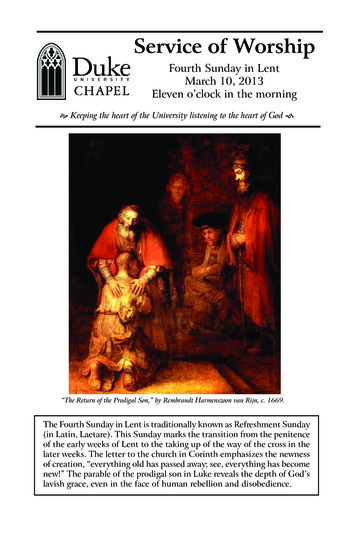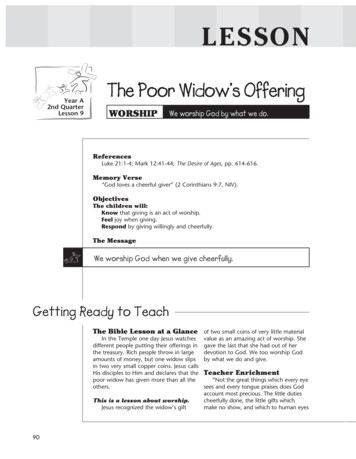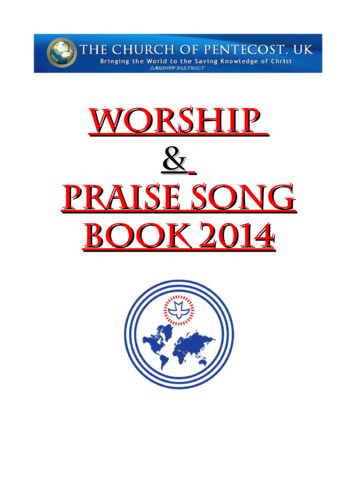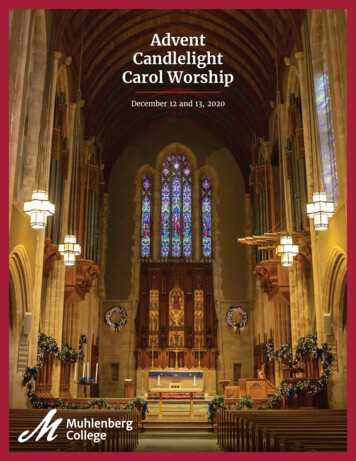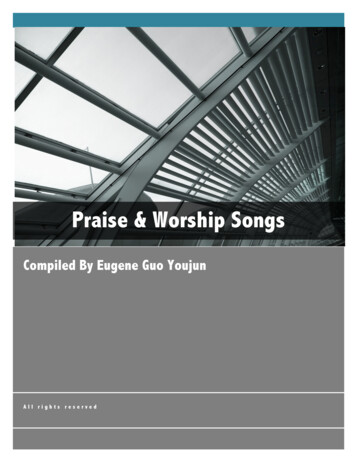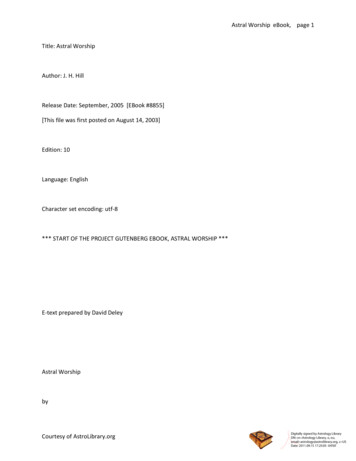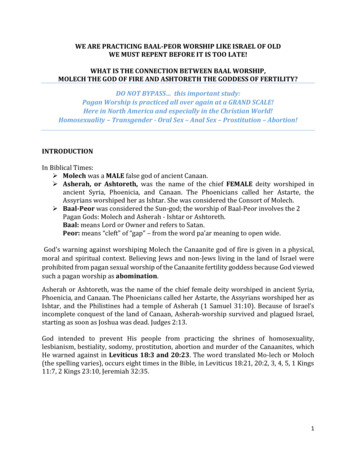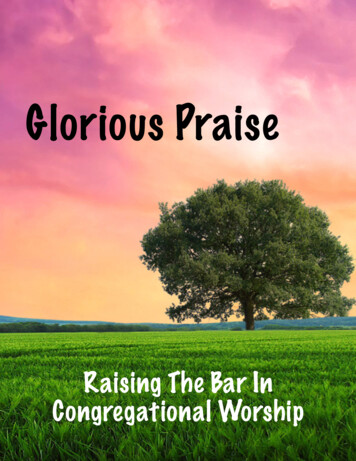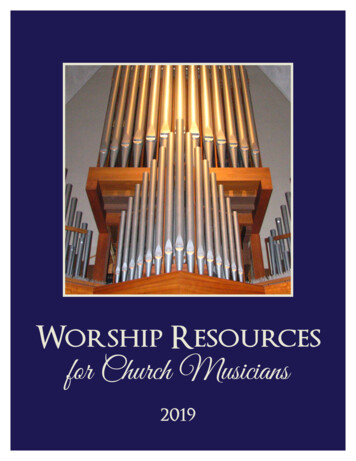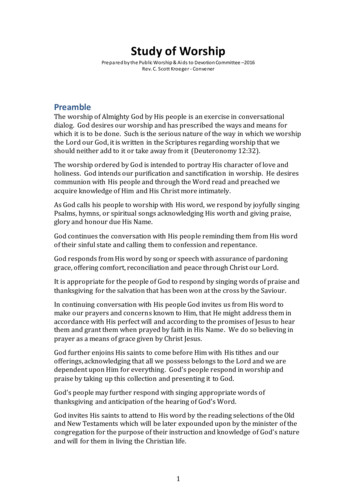
Transcription
Study of WorshipPrepa red by the Public Worship & Ai ds to Devotion Committee –2016Rev. C. Scott Kroeger - ConvenerPreambleThe worship of Almighty God by His people is an exercise in conversationaldialog. God desires our worship and has prescribed the ways and means forwhich it is to be done. Such is the serious nature of the way in which we worshipthe Lord our God, it is written in the Scriptures regarding worship that weshould neither add to it or take away from it (Deuteronomy 12:32).The worship ordered by God is intended to portray His character of love andholiness. God intends our purification and sanctification in worship. He desirescommunion with His people and through the Word read and preached weacquire knowledge of Him and His Christ more intimately.As God calls his people to worship with His word, we respond by joyfully singingPsalms, hymns, or spiritual songs acknowledging His worth and giving praise,glory and honour due His Name.God continues the conversation with His people reminding them from His wordof their sinful state and calling them to confession and repentance.God responds from His word by song or speech with assurance of pardoninggrace, offering comfort, reconciliation and peace through Christ our Lord.It is appropriate for the people of God to respond by singing words of praise andthanksgiving for the salvation that has been won at the cross by the Saviour.In continuing conversation with His people God invites us from His word tomake our prayers and concerns known to Him, that He might address them inaccordance with His perfect will and according to the promises of Jesus to hearthem and grant them when prayed by faith in His Name. We do so believing inprayer as a means of grace given by Christ Jesus.God further enjoins His saints to come before Him with His tithes and ourofferings, acknowledging that all we possess belongs to the Lord and we aredependent upon Him for everything. God’s people respond in worship andpraise by taking up this collection and presenting it to God.God’s people may further respond with singing appropriate words ofthanksgiving and anticipation of the hearing of God’s Word.God invites His saints to attend to His word by the reading selections of the Oldand New Testaments which will be later expounded upon by the minister of thecongregation for the purpose of their instruction and knowledge of God’s natureand will for them in living the Christian life.1
With praise in their hearts and resolve to heed the exhortations of the preachedword, the people of God will respond in a song of praise and worshipacknowledging the impact of grace and mercy in their lives.Being satisfied with the sacrifice of the risen Christ Jesus; and with the cleansingof His people from sin through their confession and repentance; and withsanctifying work of the Holy Spirit through the preached word, the Fatherdeclares his blessing on the people of God from the Scriptures to their comfort,assurance and grace.2
The Principles and Elements of Public Worship1-1. The Holy Scriptures are the only infallible rule of faith and practice, and assuch, the principles of public worship must be derived from the Bible, and fromno other source. We must not take on worship practices that have originatedfrom cultural influences.The Scriptures forbid the worshipping of God by images, or in any other way notappointed in His Word. They require the receiving, observing, and keeping pureand entire all such religious worship and ordinances as God appoints in HisWord (Westminster Shorter Catechism (WSC) Q&A 50, 51; WestminsterConfession of Faith (WCF) 21.1-2, 6).1-2. A service of public worship is not merely a gathering of God's children witheach other, but before all else, a meeting of the triune God with His chosenpeople. God is present in public worship not only by virtue of the Divineomnipresence but, much more intimately, as the faithful Covenant Saviour. TheLord Jesus Christ said: "Where two or three are gathered together in My namethere I am in the midst of them" (Matthew 18:20). It is proper and fitting to referto the second person of the Trinity as Jesus Christ, Christ Jesus, the Lord JesusChrist, the Son (of God), the Lord. This makes clear acknowledgement that theJesus born of the Virgin Mary, taking to himself our human flesh is not only ofour flesh, but the incarnate Son of God whom we worship and adore as thesecond person of the eternal Godhead.1-3. The focus and end of public worship is always the glory of God. His peopleshould engage in all component parts with the view to His glory. Public worshiphas as its aim the building of Christ's Church by the perfecting of the saints andthe addition to its membership of such as are being saved -- all to the glory ofGod. Through public worship on the Lord's day Christians should learn to serveGod all the days of the week in their every activity, remembering, whether theyeat or drink, or whatever they do, to do all to the glory of God (1 Corinthians10:31).1-4. Public worship is only Christian when those worshipping recognize thatChrist is the only Mediator by whom they can come unto God, when they hono urChrist as the head of the church, who rules over public worship, and when theirworship is an expression of their faith in Christ and of their love for Him.1-5. Jesus said, “Yet a time is coming and has now come when the true worshiperswill worship the Father in spirit and truth, for they are the kind of worshipers theFather seeks” (John 4:23). All attempts at introducing worldly or cultural aspectsto worship, whether modern or historical must stand condemned. Neither shallthe worship of God be reduced to the performance of symbolic religious acts thatare devoid of any connection to the Spirit of God and are done hypocritically.The outward forms of public worship only have value when they serve toexpress the inner reverence of worshippers and their sincere devotion to thetrue and living God. And only those whose hearts have been renewed by theHoly Spirit are capable of such reverence and devotion.3
1-6. The Lord Jesus Christ has prescribed no fixed forms for public worship but,in the interest of life and power in worship, He has given His Church a largemeasure of liberty in this matter. However, we must not forget that there is trueliberty only where the rules of God's Word are observed and the Spirit of theLord is. We are reminded that all things must be done decently and in order andthat God's people should serve Him with reverence and in the beauty of holiness.From its beginning to its end a service of public worship should be characterizedby that simplicity which is an evidence of sincerity and by that beauty anddignity which are a manifestation of holiness. Orders of worship should becarefully planned and thought through in their preparation and participantstrained and practiced in the orderly worship of God.“But everything should be done in a fitting and orderly way.”(1 Corinthians 14:39–40 NIV)1-7. Public worship must be distinguished from private worship. In publicworship God is served by His saints as His covenant people, united in the body ofChrist. For this reason, covenant children should not be discouraged from theirpresence in worship so far as possible, along with adults.“But Jesus called the children to him and said, “Let the little children come to me,and do not hinder them, for the kingdom of God belongs to such as these”(Luke 18:16 NIV).For the same reason, no favouritism may be shown to anyone who attends publicworship. Nor may any member of the church presume to exalt themselves aboveothers as though they were more spiritual. Elders and worship leaders shouldnot be exalted over others. They minister to the body of Christ as servants.“Do nothing out of selfish ambition or vain conceit, but in humility consider othersbetter than yourselves.” (Philippians 2:3)1-8. It is fitting for all God's people not only to come into His presence with adeep sense of awe at the thought of His perfect holiness and their own exceedingsinfulness. Suitable preparation should be made in the day and hours beforegathering public worship in anticipation of meeting with a holy God by planningahead for the Sabbath e.g. preparing meals ahead of time so you don’t have towork on Sunday, ensuring there is fuel in the automobile to get to church, thatyou retire early enough in the evening that you might waken refreshed forchurch services on the Sabbath etc.Additionally, we are called “to enter into His gates with thanksgiving and into Hiscourts with praise” (Psalm 100:4) for the great salvation which He has sograciously provided for us through his only begotten Son and applied to them bythe Holy Spirit.1-9. The Bible teaches that the following are proper elements or components ofa proper worship service:1. call of God to come and worship4
“Shout for joy to the LORD, all the earth. Worship the LORD with gladness;come before him with joyful songs. Know that the LORD is God. It is he whomade us, and we are his; we are his people, the sheep of his pasture.Enter his gates with thanksgiving and his courts with praise; give thanks tohim and praise his name. For the LORD is good and his love enduresforever; his faithfulness continues through all generations.”(Psalms 100:1–5 NIV)“Yet a time is coming and has now come when the true worshipers willworship the Father in spirit and truth, for they are the kind of worshipersthe Father seeks. God is spirit, and his worshipers must worship in spirit andin truth.”” (John 4:23–24 NIV)2. confession of sin“Have mercy on me, O God, according to your unfailing love; according toyour great compassion blot out my transgressions.Wash away all my iniquity and cleanse me from my sin.For I know my transgressions, and my sin is always before me.Against you, you only, have I sinned and done what is evil in your sight, sothat you are proved right when you speak and justified when you judge.Surely I was sinful at birth, sinful from the time my mother conceived me.Surely you desire truth in the inner parts; you teach me wisdom in theinmost place.Cleanse me with hyssop, and I will be clean; wash me, and I will be whiterthan snow.Let me hear joy and gladness; let the bones you have crushed rejoice.Hide your face from my sins and blot out all my iniquity.Create in me a pure heart, O God, and renew a steadfast spirit within me.Do not cast me from your presence or take your Holy Spirit from me.Restore to me the joy of your salvation and grant me a willing spirit, tosustain me.Then I will teach transgressors your ways, and sinners will turn back toyou.Save me from bloodguilt, O God, the God who saves me, and my tongue willsing of your righteousness.O Lord, open my lips, and my mouth will declare your praise.You do not delight in sacrifice, or I would bring it; you do not take pleasurein burnt offerings.The sacrifices of God are a broken spirit; a broken and contrite heart, OGod, you will not despise.In your good pleasure make Zion prosper; build up the walls of Jerusalem.Then there will be righteous sacrifices, whole burnt offerings to delight you;then bulls will be offered on your altar.” (Psalms 51:1–19 NIV)““But the tax collector stood at a distance. He would not even look up toheaven, but beat his breast and said, ‘God, have mercy on me, a sinner.’”(Luke 18:13 NIV)““Repent, for the kingdom of heaven is near.”” (Matthew 3:2 NIV)““The kingdom of God is near. Repent and believe the good news!””(Mark 1:15 NIV)“Repent, then, and turn to God, so that your sins may be wiped out, thattimes of refreshing may come from the Lord,” (Acts 3:19 NIV)5
3. assurance of faith and forgiveness“Therefore, brothers, since we have confidence to enter the Most Holy Placeby the blood of Jesus, by a new and living way opened for us through thecurtain, that is, his body, and since we have a great priest over the house ofGod, let us draw near to God with a sincere heart in full assurance of faith,having our hearts sprinkled to cleanse us from a guilty conscience andhaving our bodies washed with pure water.” (Hebrews 10:19–22 NIV)4. reading of Holy Scripture,“Until I come, devote yourself to the public reading of Scripture, topreaching and to teaching.” (1 Timothy 4:13 NIV)“Blessed is the one who reads the words of this prophecy, and blessed arethose who hear it and take to heart what is written in it, because the time isnear.” (Revelation 1:3 NIV)5. singing of psalms, hymns and spiritual songs,“Let the word of Christ dwell in you richly as you teach and admonish oneanother with all wisdom, and as you sing psalms, hymns and spiritual songswith gratitude in your hearts to God.” (Colossians 3:16 NIV)6. the offering of prayer,“I urge, then, first of all, that requests, prayers, intercession andthanksgiving be made for everyone— for kings and all those in authority,that we may live peaceful and quiet lives in all godliness and holiness.”(1 Timothy 2:1–2 NIV)7. the preaching of the Word,“Preach the Word; be prepared in season and out of season; correct, rebukeand encourage—with great patience and careful instruction.”(2 Timothy 4:2 NIV)8. the presentation of tithes and offerings,ascribe to the Lord the glory due his name. Bring an offering and comebefore him; worship the Lord in the splendour of his holiness.(1 Chronicles 16:29 NIV)“Jesus sat down opposite the place where the offerings were put andwatched the crowd putting their money into the temple treasury. Many richpeople threw in large amounts. But a poor widow came and put in two verysmall copper coins, worth only a fraction of a penny.Calling his disciples to him, Jesus said, “I tell you the truth, this poor widowhas put more into the treasury than all the others. They all gave out of theirwealth; but she, out of her poverty, put in everything—all she had to liveon.”” (Mark 12:41–44 NIV)9. confessing the faith,“That if you confess with your mouth, “Jesus is Lord,” and believe in yourheart that God raised him from the dead, you will be saved. For it is withyour heart that you believe and are justified, and it is with your mouth thatyou confess and are saved.” (Romans 10:9–10 NIV)10. observing the Sacraments,“Peter replied, “Repent and be baptized, every one of you, in the name ofJesus Christ for the forgiveness of your sins. And you will receive the gift ofthe Holy Spirit. The promise is for you and your children and for all who arefar off—for all whom the Lord our God will call.”” (Acts 2:38–39 NIV)6
“Therefore go and make disciples of all nations, baptizing them in the nameof the Father and of the Son and of the Holy Spirit, and teaching them toobey everything I have commanded you. And surely I am with you always, tothe very end of the age.”” (Matthew 28:19–20 NIV)“For I received from the Lord what I also passed on to you: The Lord Jesus,on the night he was betrayed, took bread, and when he had given thanks, hebroke it and said, “This is my body, which is for you; do this in remembranceof me.” In the same way, after supper he took the cup, saying, “This cup isthe new covenant in my blood; do this, whenever you drink it, inremembrance of me.” For whenever you eat this bread and drink this cup,you proclaim the Lord’s death until he comes.”(1 Corinthians 11:23–26 NIV)11. on special occasions taking oaths and vows,“When a man makes a vow to the LORD or takes an oath to obligate himselfby a pledge, he must not break his word but must do everything he said.”(Numbers 30:2 NIV)““Again, you have heard that it was said to the people long ago, ‘Do notbreak your oath, but keep the oaths you have made to the Lord.’ But I tellyou, Do not swear at all: either by heaven, for it is God’s throne; or by theearth, for it is his footstool; or by Jerusalem, for it is the city of the GreatKing. And do not swear by your head, for you cannot make even one hairwhite or black. Simply let your ‘Yes’ be ‘Yes,’ and your ‘No,’ ‘No’; anythingbeyond this comes from the evil one.” (Matthew 5:33–37 NIV)12. the charge to the congregation,““Now fear the LORD and serve him with all faithfulness. Throw away thegods your forefathers worshiped beyond the River and in Egypt, and servethe LORD. But if serving the LORD seems undesirable to you, then choosefor yourselves this day whom you will serve, whether the gods yourforefathers served beyond the River, or the gods of the Amorites, in whoseland you are living. But as for me and my household, we will serve theLORD.”” (Joshua 24:14–15 NIV)“I charge you, in the sight of God and Christ Jesus and the elect angels, tokeep these instructions without partiality, and to do nothing out offavouritism.” (1 Timothy 5:21 NIV)“And let us consider how we may spur one another on toward love and gooddeeds. Let us not give up meeting together, as some are in the habit of doing,but let us encourage one another—and all the more as you see the Dayapproaching.” (Hebrews 10:24–25 NIV)13. God’s blessing on His people“The LORD bless you and keep you;the LORD make his face shine upon you and be gracious to you;the LORD turn his face toward you and give you peace.”(Numbers 6:24–26 NIV)“May the grace of the Lord Jesus Christ, and the love of God, and thefellowship of the Holy Spirit be with you all.” (2 Corinthians 13:14 NIV)“May he give you and your descendants the blessing given to Abraham, sothat you may take possession of the land where you now live as an alien, theland God gave to Abraham.”” (Genesis 28:4 NIV)7
14. worshipping God in fellowship“Then all the people went away to eat and drink, to send portions of foodand to celebrate with great joy, because they now understood the wordsthat had been made known to them.” (Nehemiah 8:12 NIV)“They devoted themselves to the apostles’ teaching and to the fellowship, tothe breaking of bread and to prayer. Everyone was filled with awe, andmany wonders and miraculous signs were done by the apostles. All thebelievers were together and had everything in common. Selling theirpossessions and goods, they gave to anyone as he had need. Every day theycontinued to meet together in the temple courts. They broke bread in theirhomes and ate together with glad and sincere hearts, praising God andenjoying the favor of all the people. And the Lord added to their numberdaily those who were being saved.” (Acts 2:42–47 NIV)1-10. It is God who determines how it is that His people worship Him. We arenot to deviate from the commands concerning His worship and prescribed partsthereof. “See that you do all I command you; do not add to it or take away from it.”(Deuteronomy 12:32 NIV). We are not to introduce new and different elementsof worship not commanded by God and include them in any worship liturgy.This is commonly called the Regulative Principle of Worship.However, we must distinguish between God’s commands in the components ofworship, and that of the ways and means by which we accomplish them. Wemust not take on worship principles or components that have originated fromwithin any given culture. We must instead practice our culture-free worshipprinciples within the confines of our culture. The worship of God will often differfrom culture to culture and from church to church in terms of the expression andcreativity, and yet still comprise the same God ordained components of worship.For example, one congregation may choose to use an organ to accompanycongregational singing, while another might choose to use a contemporary band.The former may choose to use a hymnbook, the latter using contemporary musicdisplayed through projection devices. Some churches may use choirs to lead thesinging, while others may use song leaders. One might have the choir sing aScriptural call to worship, while others might just read a passage from Scripture .A church may choose to use a responsive reading for their confession of sin,while another church has a time of silence before the minister leads thecongregation in corporate prayer. All of these ways of expression areappropriate before the Lord when done with genuine service and worship of theheart but the components of worship never change and are always included insome way. The exceptions are baptisms, which are occasional by nature and theLord’s Supper, which may be celebrated only occasionally. All other elementsshould be present in every service.8
The Sanctification of the Lord's Day2-1. "The fourth commandment requires the keeping holy to God such set timesas He has appointed in His word; expressly one whole day in seven, to be a holySabbath to himself." (See WSC Q&A 58; WCF 21.7-8).2-2. God commanded His Old Testament people to keep holy the last day of theweek, but He sanctified the first day as the Sabbath by the resurrection of theLord Jesus Christ from the dead. For this reason the church of the newdispensation has from the time of the apostles kept holy the first day of the weekas the Lord's Day.“On the Lord’s Day I was in the Spirit (Revelation 1:10a NIV)“On the first day of every week, each one of you should set aside a sum of money inkeeping with his income, saving it up, so that when I come no collections will haveto be made.” (1 Corinthians 16:2 NIV)2-3. It is the duty of every person to remember the Lord's day; and to preparefor it before its approach. All worldly business should be so ordered, and allduties deferred as can be, so that there may be no hindrance to sanctifying theSabbath, as the Holy Scriptures require.2-4. The whole day is to be kept holy to the Lord; and to be employed in thepublic and private exercises of religion. Therefore, it is requisite, that there be aholy resting, all the day, from unnecessary labours; and an abstaining from thoserecreations which may be lawful on other days; and also, as much as possible,from such thoughts and conversation as would be usual and ordinary during therest of the week.““If you keep your feet from breaking the Sabbath and from doing as you please onmy holy day, if you call the Sabbath a delight and the LORD’S holy day honourable,and if you honour it by not going your own way and not doing as you please orspeaking idle words, then you will find your joy in the LORD, and I will cause you toride on the heights of the land and to feast on the inheritance of your father Jacob.”The mouth of the LORD has spoken.” (Isaiah 58:13–14 NIV)2-5. The needs and affairs of individuals and families should be so arrangedbeforehand in order that other persons might not be kept from their publicworship of God, or hindered from also sanctifying the Sabbath.(Nehemiah 13:15–22 NIV)2-6. Before attending public worship, every person and family should take careto approach God, by secret and private prayer, for themselves and others, andespecially for the assistance of God to their minister. They should pray for God’sblessing upon his ministry, the reading and preaching of the Scriptures, and aholy examination and meditation of participants as they prepare for communionwith God in his public ordinances.2-7. It is beneficial and desirable for the time not used for public worship to bespent in prayer, in devotional reading, and especially in the study of theScriptures, mediation, catechism instruction, godly conversation on spiritual9
topics, the singing of psalms, hymns and spiritual songs, and holy resting .Recalling the teaching of Jesus that it is lawful to do good on the Sabbath,activities such as visiting the sick, relieving the poor, teaching one another, andother such duties of love and mercy are also appropriate.“Another time he went into the synagogue, and a man with a shrivelled hand wasthere. Some of them were looking for a reason to accuse Jesus, so they watched himclosely to see if he would heal him on the Sabbath. Jesus said to the man with theshrivelled hand, “Stand up in front of everyone.”Then Jesus asked them, “Which is lawful on the Sabbath: to do good or to do evil, tosave life or to kill?” But they remained silent.He looked around at them in anger and, deeply distressed at their stubborn hearts,said to the man, “Stretch out your hand.” He stretched it out, and his hand wascompletely restored.” (Mark 3:1–5 NIV)The Ordering of Public Worship3-1. When the congregation is to meet for public worship, people (havingprepared their hearts beforehand) should all join together; not absentingthemselves from the public ordinances through negligence, or to meet in smallerprivate and exclusive groups instead. “And let us consider how we may spur oneanother on toward love and good deeds. Let us not give up meeting together, assome are in the habit of doing, but let us encourage one another—and all the moreas you see the Day approaching” (Hebrews 10:24–25).3-2. It is important for everyone to be punctual, so that all are present at thebeginning to unite with one heart in all the parts of public worship. And it isimportant that they stay until after the blessing is pronounced at the conclusionof the service.3-3. Everyone should be encouraged to be seated well in time for the service tobegin, in a decent and reverent manner. It is good for them to engage in a silentprayer for a blessing upon themselves, the minister, and all present, as well asupon those who are unable to attend worship.3-4. All who attend public worship should come in a spirit of reverence andgodly fear, refraining from any conduct unbecoming to the place and occasion.Since the family, as ordained by God, is the basic institution in society, and God inthe Covenant graciously deals with us, not just as individuals but also as families,it is important and desirable that families worship together.The Call of God To Come And Worship4-1. It is God who calls and saves us and the Lord God calls all his people tocome and worship Him in Spirit and in Truth. The call to worship comes from avariety of Scriptural sources the minister or appointed worship leader may use .The gathering of God’s people is not limited to a building or other “sacred space”10
as the earth is the Lord’s and all that is in it. God’s call for His people to come andworship brings with it the understanding of preparation beforehand of eachworshipper, readying themselves to come before the Lord God in thecommunion and fellowship of His saints.4-2. The minister or appointed worship leader should use appropriate Scripturetexts that enjoin God’s people to come and worship Him. These texts will usuallyinclude the imperative forms of the biblical language.Confession of Sins5-1. Having been called into the presence of God, people must realise the natureof a holy God compared to their own sinful natures. The Lord God calls His saintsto confess their sins and be cleansed by the infinitely precious blood of the La mb.This can be done in a number of ways using Scriptural confessions, formconfessions, prayers of confession, or even songs and hymns.5-2. Confession of sins should regularly have a national and local aspect, andmost certainly a focus on an individual’s personal and corporate sins.Recognition should be given of the finished work of the Saviour Jesus Christ onthe Cross as the payment required of the Father for ours and the sin of the world.Enjoining the continuing presence and work of the Holy Spirit in us to recreateus to be more like Jesus is encouraged.The Assurance Of Pardon6-1. Prayers for confession of sin are often done separately. When completed,an important component of worship involves the minister speaking as themouthpiece of God and using Scripture giving the congregation of saints anassurance of God’s pardoning grace in Christ Jesus. There is great spiritual valuein letting people know the import of the Gospel’s grace in their lives and the lifeof the congregation.6-2. The assurance of pardon also provides another avenue for the proclamationof the Gospel and the evangelism of those not yet in the Kingdom of Christ Jesus.The Public Reading of the Holy Scriptures7-1. The public reading of the Holy Scriptures is performed by someoneauthorised to do so by the Church, as God's servant. Through it God speaks mostdirectly to the congregation, even more directly than through the sermon . Thereading of the Scriptures is to be distinguished from the responsive readin g ofcertain portions of Scripture by the leader and the congregation. In the formerGod addresses His people; in the latter God's people give expression in the wordsof Scripture to their contrition, adoration, gratitude and other holy sentiments .The psalms of Scripture are especially appropriate for responsive reading .(See WCF 21.5)11
7-2. The reading of the Holy Scriptures in the congregation is a part of the publicworship of God and should be done by the minister or some other appointedbeliever.7-3. The Holy Scriptures of the Old and New Testaments shall be read from agood and suitable translation, in the current language of the people, that all mayhear and understand. (See WCF 1; WLC Q&A 3-6)7-4. How large any portion of Scripture to be read during a service is left to thediscretion of every minister; and he may, when he thinks it expedient, expoundany part of what is read; always having regard to the time of the service as awhole, that neither reading, singing, praying, preaching, nor any other ordinance,be disproportionate such that their importance is minimised or impoverished;nor should the reading of the whole Scripture be rendered too short, or so longthat it becomes tedious to the hearers.The Singing of Psalms and Hymns8-1. Praising God through the medium of music is a duty and a privilege.Therefore, the singing of hymns and psalms and the use of musical instrumentsshould have an important part in public worship.“Speak to one another with psalms, hymns and spiritual songs. Sing and makemusic in your heart to the Lord,” (Ephesians 5:19 NIV)“Sing for joy to God our strength; shout aloud to the God of Jacob! Begin the music,strike the tambourine, play the melodious harp and lyre.” (Psalms 81:1–2 NIV)8-2. In singing the praises of God, we are to sing in the spirit of worship, withunderstanding in our hear
The worship of Almighty God by His people is an exercise in conversational . The Holy Scriptures are the only infallible rule of faith and practice, and as such, the principles of public worship must be derived fr
